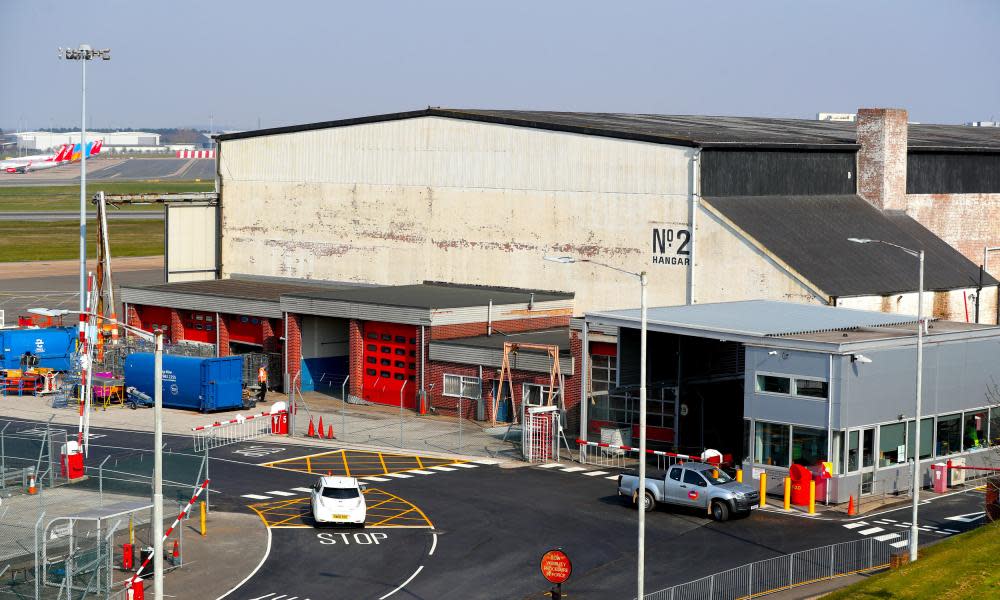Temporary mortuary being built at Birmingham airport

A temporary mortuary is being put in place at Birmingham airport with space for up to 12,000 bodies amid growing concern over the speed at which the virus is spreading in the West Midlands.
The airport is next to Birmingham’s National Exhibition Centre, which had been mooted as a location for a temporary field hospital.
The hangar facility will initially have space for 1,500 bodies, “but will expand to hold more”, according to the West Midlands and Warwickshire strategic coordination group, made up of police, councils and other agencies.
The West Midlands has seen another sharp rise in deaths after becoming a hotspot for transmissions of the virus earlier this week. It also emerged that there have been delays in testing in the region, with some patients waiting five days for a diagnosis.
Related: Coronavirus UK: how many confirmed cases are in your area?
Of the 115 new deaths reported across the UK in Thursday’s update, 40 were in the West Midlands. By Friday there had been a total of 156 deaths recorded in NHS trusts across the Midlands – one in five of the total deaths in the UK.
Thirty-seven of those who have died were being treated by the Royal Wolverhampton NHS trust, the second highest death toll from the virus for any trust in the UK.
Helen Carter, deputy director of Public Health England West Midlands, said that high levels of historical deprivation and smoking, combined with the region’s industrial past, could be leading to a higher than normal rate of coronavirus-related deaths.
Carter added that the country was on an “upward curve” of the pandemic, with the West Midlands and in particular the Black Country at the forefront of the next wave outside London.
She said following analysis of the data, a number of hypotheses had been mooted about what could be contributing to the cluster of deaths. “Firstly, it is not unexpected that we are seeing a spread of the cases around the country. It could be that we have good transport links between London and Wolverhampton … it could be the impacts of deprivation – we have had historically high levels of smoking and industry across the Black Country and we know there is a gap in health in the region.”
Earlier this week the government said it was investigating the reasons behind a hotspot emerging in the region. Anecdotal evidence suggested people’s religious convictions and fears of social isolation could be leading to a sharp rise in the number of transmissions in the area.
Carter agreed that slow uptake of the government’s social distancing guidelines could have contributed to the anomaly. “It could be that high levels of community transmission which went undetected, and then the impacts of lack of social distancing a few weeks ago, could also have contributed.”
One doctor working at a hospital in the Sandwell and West Birmingham NHS trust said that, although it was unsurprising Birmingham had emerged as a hotspot, being the second biggest city in the country, a number of factors might have intensified the crisis.
The doctor, who is self-isolating after contracting the virus, pointed out that a sizeable international student population, large numbers of residents commuting to London, and the fact the region was home to deprived areas where levels of spoken English were low may have contributed to the problem.
Related: The coronavirus pandemic: visualising the global crisis
The medic, who wanted to remain anonymous, added that the issue had been compounded by the fact that under government guidance doctors are not allowed to wear surgical masks when not working on wards with coronavirus patients.
“Even for a sick patient likely to have Covid-19, until the swab comes back, the government says to just wear a surgical mask, no FFP3 [respirator],” the doctor added. “We think we should be wearing surgical masks for all patients, to protect us and them. We know from studies now that unlike Sars, this virus [...] can be contagious potentially before the patients have symptoms.”
Although the trust is beginning to develop testing for the virus at individual hospitals, patient swabs are currently being sent to Heartlands hospital’s infectious diseases and tropical medicine unit in Birmingham, meaning delays of up to five days.
Carter admitted that there was a testing backlog, but said the situation was improving. “We absolutely understand the frustrations around the delay in test results that we experienced a couple of weeks ago. In the vast majority of cases, we are now seeing results coming through within 48 hours. We fully appreciate that there have been delays in testing, but we are hopeful that they will be resolved, if they have not been resolved already,” she said.
Robin May, a professor of infectious diseases at the University of Birmingham, maintained that the numbers were as expected due to population numbers in urban parts of the country. “This is essentially what we were expecting – that there would be a significant rise in numbers across the UK. It is in tune with what we envisaged at the start of this curve, that it would go up in major urban centres like Birmingham and London,” he said.

 Yahoo News
Yahoo News 
